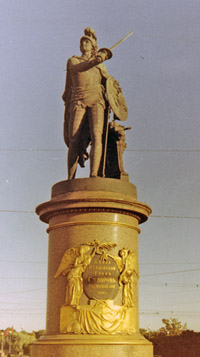
Suvorov Monument
Aleksandr Suvorov was probably one of Imperial Russia's finest military commanders, never having been defeated in battle. He came from an old noble family that traced its roots of military service back to the sixteenth century. Suvorov began serving in the army in 1748, and during the Seven Years' War (1756-1763) he performed a variety of duties and got some experience leading troops into battle. His campaigns in Poland during the First Partition, earned him high praise (and promotion). He performed brilliantly during the first war with Turkey (1768-74); between 1778 and 1783 in the Crimea and Caucasus where he was wounded in battle; the second war with Turkey (1787-1792) where he won a series of spectacular victories; and 1793-94 in Poland again.
It was after the campaign in Poland that Suvorov wrote his military manual, the Science of Victory (Nauka Pobedy), which circulated in manuscript form before finally being published in 1806. He was noted for the saying "Train hard, fight easy."
Tsar Paul I, upon assuming the throne, began to transform the Russian army on the basis of the Prussians, who Paul so adored. This Suvorov objected to. So in February 1797 Paul dismissed Suvorov and had him exiled and put under surveillance.
Suvorov's greatest moment came in the wars of the Second Coalition (Great Britain, Austria, Russia, Naples) against France beginning in 1798. At the request of Russia's allies, Paul had to recall Suvorov to active service and appoint him the commander-in-chief of the allied forces in Northern Italy. There Suvorov succeeded in defeating the French forces and removing France from the whole of Northern Italy. In the middle of August 1799, Paul and the Austrian Emperor ordered Suvorov to continue the war and join the allied troops in Switzerland. Suvorov, in one of the truly great feats of military history, was able to cross the Alps with his army, facing a series of brutal marches and skirmishes with the French. In Switzerland, Suvorov found his army in a desperate position, almost entirely surrounded by the French. After fighting his way out of the mess, the tsar ordered Suvorov to return to Russia. It was the end of Suvorov's campaign.
Suvorov and Paul did not see eye-to-eye, and Suvorov remained essentially banished to his estate until his death on 15 May 1800. He was buried in the Annunciation Cathedral at the Aleksandr Nevskii Lavra in St. Petersburg with a plain tombstone inscribed, "Suvorov Lies Here."
Some other websites:
- Alexander Suvorov, Russian Marshall
- Alexander Suvorov
- Alexander V. Suvorov, Russian Field Marshal
- wikipedia entry on Suvorov
- Alexander Vasilievich Suvorov
- Bruce Menning, "Train Hard, Fight Easy": the Legacy of A. V. Suvorov and His "Art of Victory," Air University Review (November-Decembr 1986)